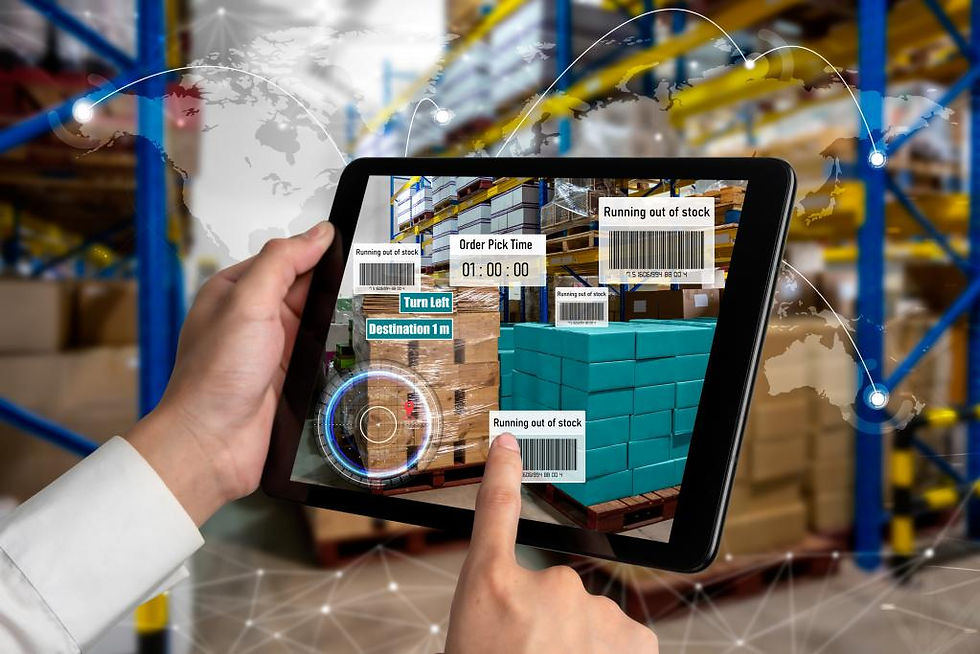How ERP Insights Help Drive Digital Growth for SMEs
- Cinnex Resources

- Feb 12, 2025
- 5 min read
Updated: Feb 20, 2025

As small and medium enterprises (SMEs) strive to grow, these businesses also need to adapt quickly, embrace technology, and optimize processes. One of the most effective ways to achieve this is by leveraging Enterprise Resource Planning (ERP) systems, which offer valuable ERP insights that help businesses drive digital growth.
Enterprise Resource Planning (ERP) is a comprehensive software solution that integrates core business functions, such as finance, human resources, inventory, sales, and procurement, into a single platform. For SMEs, ERP systems are crucial in helping them automate and simplify their processes, ensuring that business functions work seamlessly and data is accurate and up-to-date.
An ERP system provides organizations with powerful tools to manage data, make informed decisions, and optimize operations. The real-time data insights it provides can drastically improve efficiency and reduce costs— one of key factors that contribute to the digital growth of SMEs. By integrating various functions within the business, ERP systems enable SMEs to stay competitive and scale their operations more effectively.
ERP Insights: The Power Behind Digital Transformation
Digital transformation is no longer optional for businesses—it's essential for survival in today's digital-first world. ERP systems, especially those powered by advanced technologies like AI, provide SMEs with the insights they need to thrive in the digital age. These ERP insights help businesses optimize processes, enhance decision-making, and improve customer satisfaction.
Data-Driven Decision-Making
ERP systems generate real-time data that offers valuable insights into various aspects of a business. For SMEs, this means they can make decisions based on accurate, up-to-date information. ERP insights give managers and decision-makers access to reports, dashboards, and analytics that help them evaluate performance, spot trends, and identify areas for improvement. By leveraging this data, SMEs can make smarter, more informed decisions that drive growth and enhance operational efficiency.
For example, a small manufacturer can use ERP insights to track production rates, inventory levels, and supply chain performance, all in real time. This helps them make quicker adjustments to their processes, ensuring that resources are allocated optimally and production is on track.
Automate Operations and Reducing Costs
One of the primary benefits of ERP systems is the ability to automate routine tasks. SMEs can automate everything from inventory management and order processing to accounting and payroll. By using ERP Insights, SMEs can reduce the risk of errors, frees up valuable time for employees to focus on more strategic tasks, and lowers operational costs. Automation improves productivity and efficiency, enabling SMEs to scale without having to hire additional staff or deal with complex manual processes.
ERP insights also help SMEs identify inefficiencies in their workflows, which can lead to cost savings. For instance, businesses can spot inventory overages or underages, predict supply chain disruptions, and better manage cash flow. With ERP insights, SMEs can make adjustments to their processes and significantly reduce waste and overhead.
Enhancing Customer Experience
Customer satisfaction is a critical factor for the success of any business and ERP systems play a significant role in ensuring that customers receive the best possible experience. By offering insights into customer behavior, preferences, and purchasing patterns, ERP systems allow SMEs to customize their offerings to meet customer needs more effectively. With access to ERP Insights to a comprehensive view of customer data, businesses can deliver personalized service, predict demand, and respond more quickly to customer inquiries and issues.
Moreover, ERP insights help SMEs manage customer relationships by providing them with the tools needed to track interactions, monitor service levels, and measure customer satisfaction. By understanding customer needs and expectations, SMEs can create strategies to increase retention, improve loyalty, and grow their customer base.
Inventory Management and Supply Chain Optimization
For SMEs, managing inventory and supply chains efficiently can be one of the biggest challenges. Fortunately, ERP systems provide powerful insights that allow businesses to optimize their inventory and improve supply chain management. By using real-time data, ERP systems help businesses maintain optimal stock levels, reduce the risk of stockouts or overstocking, and improve forecasting accuracy.
With ERP insights, SMEs can track orders, shipments, and delivery timelines more effectively, ensuring that the right products are available at the right time. ERP systems can also help identify bottlenecks in the supply chain, enabling businesses to take proactive measures to mitigate delays and improve overall efficiency.
Scalability and Growth
As SMEs grow, their operational needs become more complex. An ERP system is scalable, meaning it can grow with the business. ERP insights allow businesses to scale their operations smoothly by offering a unified platform that adapts to increasing demands. This is particularly valuable for SMEs looking to expand into new markets or regions, as ERP systems provide the flexibility needed to manage multiple locations, currencies, and languages.
By leveraging ERP insights, SMEs can monitor performance across all areas of their business and ensure that growth is sustainable. Whether it's opening new stores, increasing production capacity, or launching new products, ERP systems provide the tools needed to manage increased complexity without compromising on quality or efficiency.
ERP Insights and AI-Powered Automation for SMEs
One of the key trends driving digital growth for SMEs is the integration of AI and automation into ERP systems. In Cinnex, AI-powered ERP solutions take traditional ERP insights to the next level by incorporating machine learning, predictive analytics, and automated decision-making capabilities. This allows businesses to not only gain valuable insights into their operations but also take action based on that data in real time.
Other than that, AI agents in ERP systems can automate complex tasks, predict future trends, and offer intelligent recommendations that improve business outcomes. For example, AI-powered ERP systems can help SMEs forecast demand, optimize inventory levels, and streamline procurement by automating repetitive tasks and analyzing data more accurately than humans.
Additionally, AI agents can help businesses make more informed decisions by providing predictive insights into factors such as customer behavior, market trends, and supply chain performance. This enables SMEs to stay ahead of the competition and make proactive decisions that drive growth.
Why SMEs Should Invest in ERP System
For SMEs, the question is not whether to adopt an ERP system, but which ERP system will deliver the most value. By investing in ERP solutions that provide actionable insights, SMEs can unlock the full potential of their business. ERP insights not only simplify operations but also enhance decision-making, reduce costs, improve customer service, and enable businesses to scale effectively.
Furthermore, ERP systems powered by AI and automation are quickly becoming a necessity for SMEs looking to stay competitive in a digital-first world. With AI agents embedded in ERP systems, businesses can automate routine tasks, predict future outcomes, and make data-driven decisions faster than ever before.
For businesses seeking to further simplify their supply chain management, an AI-powered ERP solution with integrated AI agents is a smart choice. These advanced solutions not only provide valuable insights but also automate critical tasks, allowing SMEs to focus on growing their business. If you want to make your supply chain management easier and more efficient, consider choosing Cinnex's AI-powered ERP solution with AI agents to help you grow your business. Get in touch with us at https://www.cinnex.co/contact-us now.




Comments